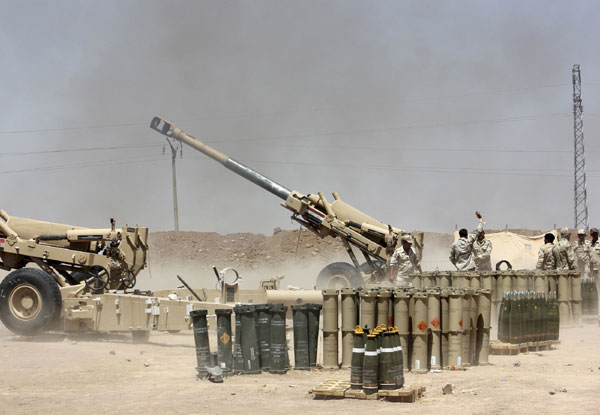US mulls airstrikes in Iraq, but no clear path forward
Updated: 2014-06-23 09:07
(Xinhua)
|
||||||||
WASHINGTON - Washington is considering airstrikes to quell Islamic extremists rolling through northern Iraq, but the situation is fraught with both political and military pitfalls, and there are no clear answers on the best path forward for the United States.
Fighters from the Sunni group Islamic State of Iraq and the Levant (ISIL) are reportedly beheading victims in a bid to instill fear as they sweep through the country's north, and have vowed to attack the capital city of Baghdad.
US President Barack Obama told reporters on Thursday that he planned to deploy up to 300 military advisors to the war-torn country to train Iraqi forces and target the militants. While Obama vowed that no US combat troops would enter the fray, experts said some sort of ground contingent would be needed to stop ISIL, and that bombing alone would not do the job.
A political solution is also needed, as military efforts will not work unless Iraq's Shiite Prime Minister Nuri al-Maliki guarantees greatly improved treatment of the Sunni Arab community by authorities in Baghdad, Wayne White, former deputy director of the US State Department's Middle East Intelligence Office, told Xinhua.
Unless the United States can extract promises from the Baghdad government for fairer treatment of Iraq's Sunni Arab community, many Sunni Arabs would perceive US air attacks as punitive strikes at the behest of al-Maliki, White added.
Indeed, the United States increasingly sees al-Maliki as a liability, and Obama administration officials have made it clear that they want a new government without al-Maliki, who they charge with sparking the current crisis by discriminating against Sunnis and not governing inclusively.
"That has contributed to the situation and the crisis we have today in Iraq," White House spokesman Jay Carney told reporters earlier this week, adding that the Iraqi people would decide the next government.
Back in Washington, the president and Congressional leaders believe the White House has the authority to take certain steps toward quelling ISIL without lawmakers' authorization, but sidestepping Congress could lead to clashes between the administration and rank-and-file lawmakers.
Washington is eyeing the war-torn country closely, not only because a trillion US dollars were spent and nearly 5,000 American lives were lost there, but also on fears that militants could use the country as a base from which to attack the United States.
But the Obama administration is unlikely to dive directly into the conflict, as the president is now concerned about his legacy, and wants to be known as the leader who ended direct US military involvement in Iraq.
So while America is unlikely to deploy large numbers of troops, one option may be the establishment of a US-enforced no-fly zone and no-drive zone, David Pollock, a Middle East expert with the Washington Institute for Near East Policy, told Xinhua.
Despite rebel gains in the country's north, the militants may already be running out of steam and may not be able to take Baghdad, causing some experts to opine that US fears of the establishment of a terror haven in Iraq are overwrought.
Rebel gains seem worse than they really are, as ISIL has not gotten much closer to Baghdad, White said, adding that militants have been taking relatively isolated towns largely cut off from Baghdad, which has put up fierce resistance.
Farther south, from the northern neighborhoods of Baghdad down to the Persian Gulf, the population is predominantly Shiite -- the militants are Sunni -- and further moves by the rebels would involve fighting Shiite Iraqi Army units and tough remobilized militias such as the Mahdi Army also now defending their sectarian turf, White noted.
- Xinjiang publishes anti-terror brochures
- Security pact sealed with Afghanistan
- President Xi encourages international cultural exchanges
- Premier Li: China willing to help Afghan infrastructure
- Chinese FM: China, Asia-Pacific become community of shared destiny
- Foreign minister remarks on possibility of China-Japan summit
Most Viewed
Editor's Picks

|

|

|

|

|

|
Today's Top News
VW defends safety of recalled New Sagitar
Former premier makes Hurun philanthropists list
Xinjiang publishes anti-terror brochures
SOHO endows $10m to Yale
Cook and Ma talk about partnership
Language a barrier to healthcare for Asian Americans
China businesses need innovation: VC
Security pact sealed with Afghanistan
US Weekly

|

|

















